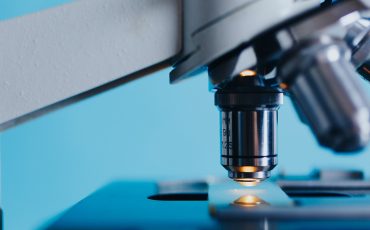A team of researchers, led by King’s College London and the University of Oxford, have found that a gene linked to type 2 diabetes and cholesterol levels is in fact a ‘master regulator’ gene, which controls the behaviour of other genes found within fat in the body.
As fat plays a key role in susceptibility to metabolic diseases such as obesity, heart disease and diabetes, this study highlights the regulatory gene as a possible target for future treatments to fight these diseases.
Published today in Nature Genetics, the study was one part of a large multi-national collaboration funded by the Wellcome Trust, known as the MuTHER study. It involves researchers from King’s College London, University of Oxford, The Wellcome Trust Sanger Institute, and the University of Geneva. DeCODE Genetics also contributed to the results reported in this paper.
It was already known that the KLF14 gene is linked to type 2 diabetes and cholesterol levels but, until now, how it did this and the role it played in controlling other genes located further away on the genome was unknown.
The researchers examined over 20,000 genes in subcutaneous fat biopsies from 800 UK female twin volunteers. They found an association between the KLF14 gene and the expression levels of multiple distant genes found in fat tissue, which means it acts as a master switch to control these genes. This was then confirmed in a further independent sample of 600 subcutaneous fat biopsies from Icelandic subjects.
These other genes found to be controlled by KLF14 are in fact linked to a range of metabolic traits, including body-mass index (obesity), cholesterol, insulin and glucose levels, highlighting the interconnectedness of metabolic traits.
The KLF14 gene is special in that its activity is inherited from the mother. Each person inherits a set of all genes from both parents. But in this case, the copy of KLF14 from the father is switched off, meaning that the copy from the mother is the active gene – a process called imprinting. Moreover, the ability of KLF14 to control other genes was entirely dependent on the copy of KLF14 inherited from the mother – the copy inherited from the father had no effect.
Professor Tim Spector from the Department of Twin Research at King’s, who led the MuTHER project, said: ‘This is the first major study that shows how small changes in one master regulator gene can cause a cascade of other metabolic effects in other genes. This has great therapeutic potential particularly as by studying large detailed populations such as the twins we hope to find more of these regulators.’
Professor Mark McCarthy from the University of Oxford, who co-led the study, said: ‘KLF14 seems to act as a master switch controlling processes that connect changes in the behaviour of subcutaneous fat to disturbances in muscle and liver that contribute to diabetes and other conditions. We are working hard right now to understand these processes and how we can use this information to improve treatment of these conditions.’
For further information please contact Emma Reynolds, Press Officer at King’s College London, on 0207 848 4334 or email emma.reynolds@kcl.ac.uk
A copy of the Nature Genetics paper is available on request.
Notes to editors
The MuTHER study stands for the Multiple Tissue Human Expression Resource study and is a five year program grant funded by the Wellcome Trust. The consortium involves over 30 scientists from the UK and Switzerland. The coordinator is Professor Spector at King’s and the other lead PIs are Professor McCarthy at Oxford, Dr Deloukas at the Wellcome Trust Sanger Institute in Hinxton and Professor Demitzakis at University of Geneva. 850 female twins have had skin, fat and blood cells collected as well as hundreds of clinical traits assessed. The overall aim of the study is to use the unique detailed genetic, genomic and phenotypic data generated from the TwinsUK study to understand the mechanisms of how genes influence common age-related and metabolic diseases. (http://www.muther.ac.uk/)
King’s College London
King’s College London is one of the top 25 universities in the world (2010 QS international world rankings), The Sunday Times ‘University of the Year 2010/11′ and the fourth oldest in England. A research-led university based in the heart of London, King’s has nearly 23,500 students (of whom more than 9,000 are graduate students) from nearly 140 countries, and some 6,000 employees. King’s is in the second phase of a £1 billion redevelopment programme which is transforming its estate.
King’s has an outstanding reputation for providing world-class teaching and cutting-edge research. In the 2008 Research Assessment Exercise for British universities, 23 departments were ranked in the top quartile of British universities; over half of our academic staff work in departments that are in the top 10 per cent in the UK in their field and can thus be classed as world leading. The College is in the top seven UK universities for research earnings and has an overall annual income of nearly £450 million.
King’s has a particularly distinguished reputation in the humanities, law, the sciences (including a wide range of health areas such as psychiatry, medicine, nursing and dentistry) and social sciences including international affairs. It has played a major role in many of the advances that have shaped modern life, such as the discovery of the structure of DNA and research that led to the development of radio, television, mobile phones and radar. It is the largest centre for the education of healthcare professionals in Europe; no university has more Medical Research Council Centres.
King’s College London and Guy’s and St Thomas’, King’s College Hospital and South London and Maudsley NHS Foundation Trusts are part of King’s Health Partners. King’s Health Partners Academic Health Sciences Centre (AHSC) is a pioneering global collaboration between one of the world’s leading research-led universities and three of London’s most successful NHS Foundation Trusts, including leading teaching hospitals and comprehensive mental health services. For more information, visit: http://www.kingshealthpartners.org/.
Oxford University’s Medical Sciences Division
Oxford University’s Medical Sciences Division is recognised internationally for its outstanding research and teaching, attracting the brightest minds from all over the world.
It is one of the largest biomedical research centres in Europe, with over 2,500 people involved in research and more than 2,800 students, and brings in around two-thirds of Oxford University’s external research income. Listed by itself, that would make it the fifth largest university in the UK in terms of research grants and contracts.
Oxford is home to the UK’s top-ranked medical school, and partnerships with the local NHS Trusts enable patients to benefit from the close links between medical research and healthcare delivery.
14 winners of the Nobel Prize for Physiology or Medicine worked or were educated at Oxford, and the division is home to 29 Fellows of the Royal Society and 68 Fellows of the Academy of Medical Sciences.
Past successes include the development of penicillin, which ushered in the modern age of antibiotics, and the confirmation of the link between smoking and cancer, which has prevented many millions of deaths. Oxford continues to be at the forefront of medical research, whether it’s the genetic and molecular basis of disease, the latest advances in neuroscience, or clinical studies in cancer, diabetes, heart disease and stroke. Oxford has one of the largest clinical trial portfolios in the UK and great expertise in taking discoveries from the lab into the clinic.
A major strength of Oxford medicine is its long-standing network of clinical research units in Asia and Africa, enabling world-leading research on the most pressing global health challenges such as malaria, TB, HIV/AIDS and flu. Oxford is also renowned for its large-scale studies into the causes and treatment of cancer, heart disease, diabetes and other common conditions.
The Wellcome Trust
The Wellcome Trust is a global charitable foundation dedicated to achieving extraordinary improvements in human and animal health. It supports the brightest minds in biomedical research and the medical humanities. The Trust’s breadth of support includes public engagement, education and the application of research to improve health. It is independent of both political and commercial interests. For more information, visit: http://www.wellcome.ac.uk/
 Researchers at King’s College London have for the first time identified a gene linked to age-related degeneration of the intervertebral discs in the spine, a common cause of lower back pain.
Researchers at King’s College London have for the first time identified a gene linked to age-related degeneration of the intervertebral discs in the spine, a common cause of lower back pain.






